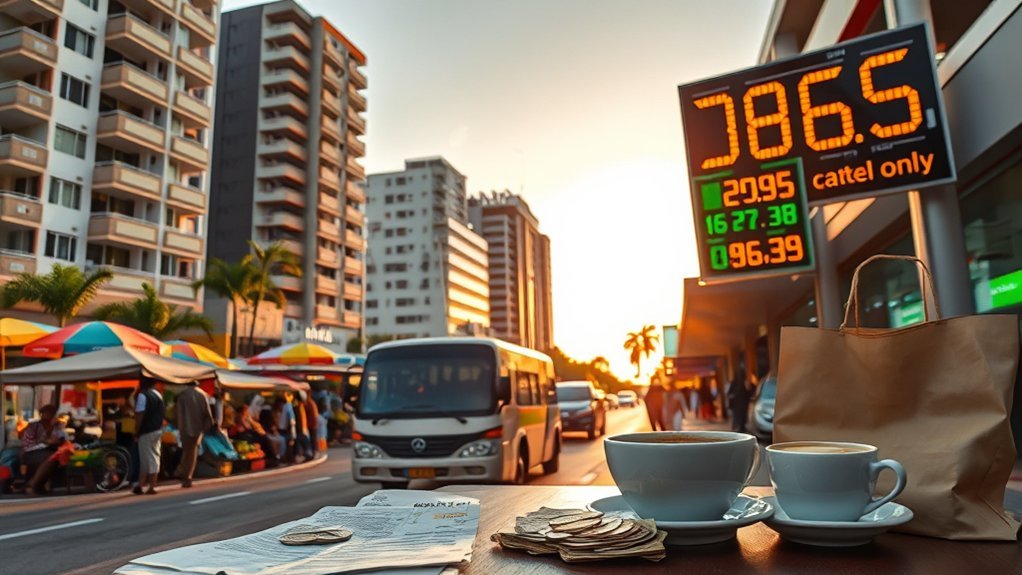You can live modestly in Botswana on about 9,000–13,000 P/month, though Gaborone costs more (one‑bed rent ≈3,000 P). Basics like groceries and local meals are cheap (inexpensive meal ≈60 P, milk ≈14 P, bread ≈8 P), utilities for a small apartment run ≈628 P, and internet about $78/month. Expect higher private healthcare costs if uninsured and permit fees for longer stays. Scroll on to get detailed city, housing and visa cost breakdowns.
Cost of Living Overview and Key Indexes in Botswana
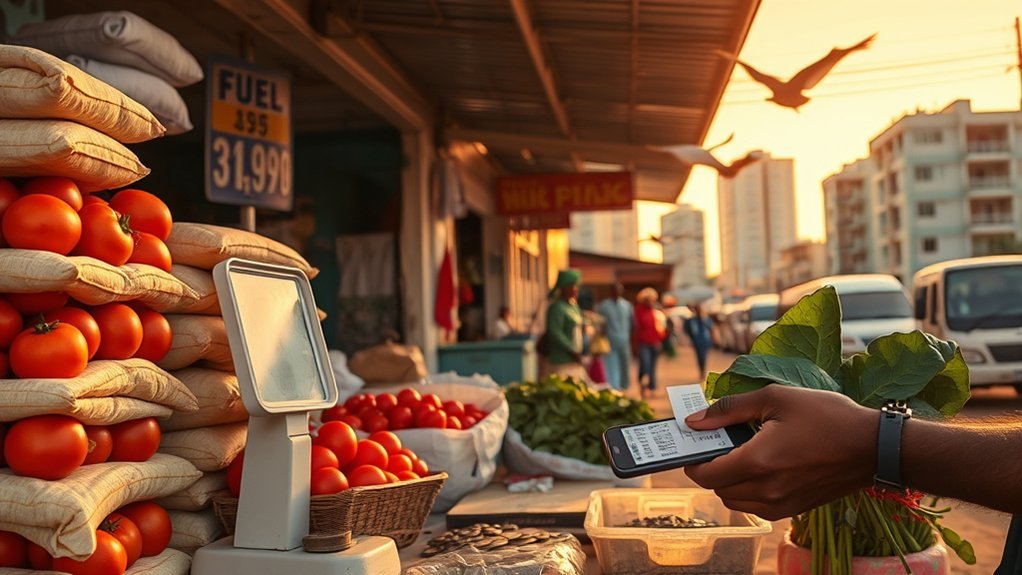
While prices vary between cities and smaller towns, you can expect Botswana’s overall cost of living index to sit at about 30.1, with Gaborone considerably higher at 42.1, reflecting pricier urban goods and services.
Botswana’s cost of living is modest overall (index ~30.1), though Gaborone is noticeably pricier at ~42.1.
In this cost of living overview, you’ll see concrete figures to plan a budget: an inexpensive restaurant meal runs about 60.00 P, while a three-course dinner for two averages 350.00 P.
Rent will dominate: expect roughly 3,000.00 P for a one-bedroom in the city center versus 1,878.57 P outside. Basic utilities for a 915 sq ft apartment average 627.78 P monthly, so factor that into your housing total.
For daily mobility, a one-way public transport ticket costs 7.00 P and a monthly pass 352.00 P.
Use these indexes and line-item costs to model scenarios—short-term visitor, monthly renter, or longer-term resident—and adjust based on lifestyle and location to forecast realistic monthly expenses.
City-by-City Comparison: Gaborone, Maun, Francistown and More
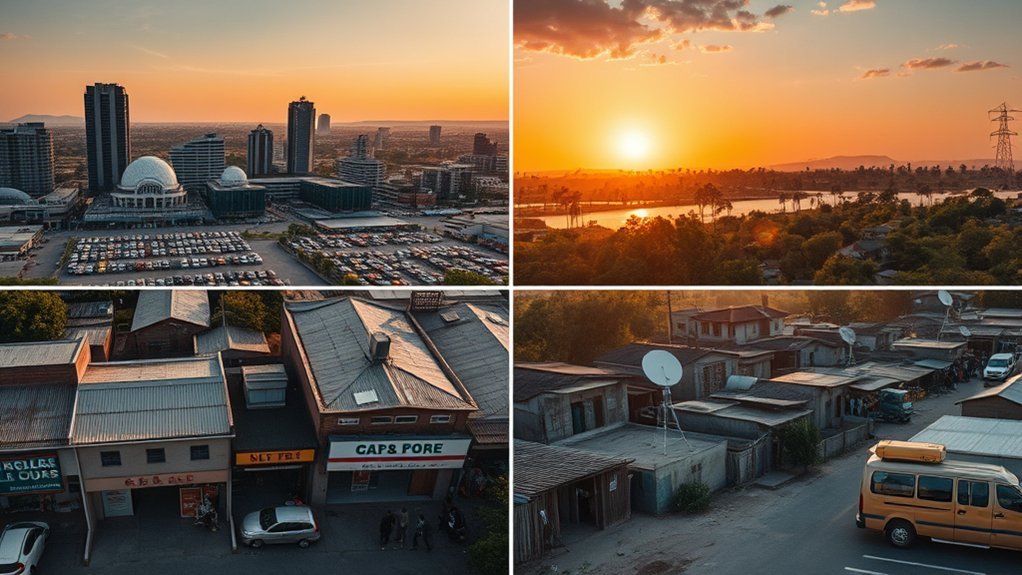
Having covered national averages and key indexes, let’s compare how those numbers play out across Botswana’s main cities so you can plan by destination.
You’ll find Gaborone leads with a cost of living index of 42.1, signaling a higher cost of living relative to Maun and Francistown. Daily spending reflects that: a 1-bedroom city-center rent in Gaborone averages 3,000.00 P, noticeably above comparable units in the other cities.
Meals and transport are steadier across locations. Expect inexpensive restaurants to run about 60.00 P in Gaborone, on par with Maun and Francistown, keeping food predictable.
Local transport one-way tickets cost roughly 7.00 P across these cities, so mobility won’t break your budget.
If you prioritize lower monthly outlays, Maun and Francistown give you more affordable housing and overall expenses.
Use Gaborone’s figures as your upper-bound planning scenario when estimating monthly costs for work or long-term travel.
Housing Costs: Rent and Property Prices Explained
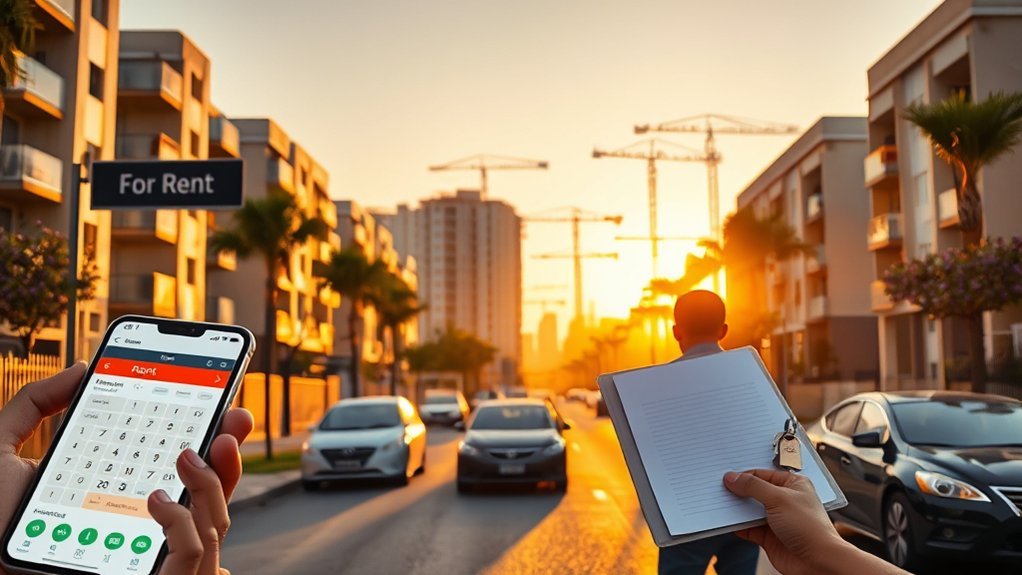
Because housing’s the biggest monthly expense you’ll face, understanding typical rents and purchase prices is essential for budgeting in Botswana.
Because housing’s your largest monthly cost, knowing typical rents and prices is key to smart budgeting in Botswana.
You’ll find housing costs concentrated in Gaborone: a city-center one-bedroom averages 3,000.00 P (range 2,500–4,000 P) and a three-bedroom averages about 6,649.38 P (range 4,500–10,000 P). Outside the center, one-bedrooms drop to ~1,878.57 P (1,500–2,500 P).
Buying is another metric: price per square foot in the city center averages 1,274.06 P (range 464.51–1,858.05 P). With average net monthly pay around 11,505.21 P, you can estimate affordability and decide whether renting or buying fits your budget.
- Compare rent-to-income: city one-bedroom ~26% of average salary.
- Consider size vs. location: three-bedrooms spike costs for families.
- Buying trade-offs: higher upfront cost, potential long-term savings via equity.
Use these figures to model options and negotiate realistic housing costs.
Food and Dining Expenses: Groceries and Eating Out
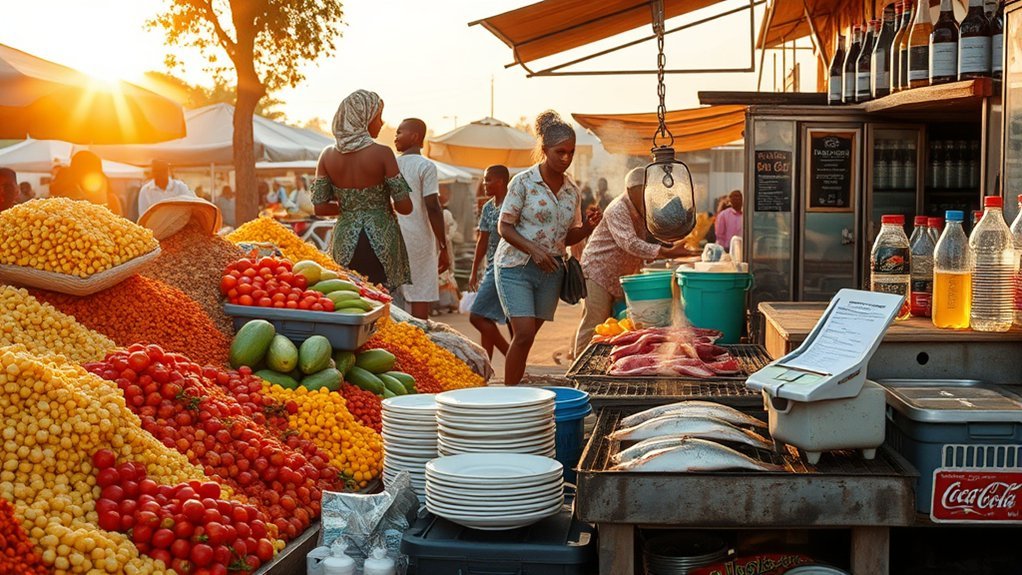
You’ll find groceries in Botswana are relatively affordable—milk is about 14 P per liter and a 0.5 kg loaf of bread runs around 8 P—so staples won’t break your budget.
Eating out varies more: an inexpensive meal averages 60 P (30–200 P) while a mid-range dinner for two is about 350 P (249–400 P).
Expect drinks to add modest costs too—draft beer ~26 P (15–35 P) and a cappuccino ~29 P (22–40 P).
Grocery Prices and Staples
While grocery staples in Botswana stay reasonably cheap, eating out can swing from budget to mid-range depending on where you go.
You’ll find grocery prices that let you prepare most meals affordably: a liter of milk runs about 14 P and half a kilo loaf of bread is roughly 8 P, so basic breakfasts and staples are low-cost.
For socializing or quick caffeine fixes, a cappuccino averages 29.05 P and domestic draught beer about 26 P.
Use markets and supermarkets to control spend; prioritize staples and seasonal produce.
- Buy milk, bread, and staples in bulk to lower per-meal cost.
- Compare café and supermarket prices for coffee and beer.
- Use local markets for cheaper produce and specials.
Eating Out Cost Ranges
After stocking up on basics, you’ll want to know what dining out will cost so you can budget nights out and quick meals.
Eating out cost ranges in Botswana are favorable for travelers and residents tracking living expenses. Expect an inexpensive restaurant meal around 60.00 P (range 30–200 P). A mid-range dinner for two averages 350.00 P (249–400 P).
Drinks add predictability: a domestic beer is about 26.00 P (15–35.08 P) and a cappuccino roughly 29.05 P (22–40 P). Fast-food combos run near 5.83 USD, significantly cheaper than comparable US prices.
Use these benchmarks to allocate weekly and monthly dining budgets, balancing groceries with occasional restaurant splurges for realistic expense planning.
Utilities, Internet and Household Bills
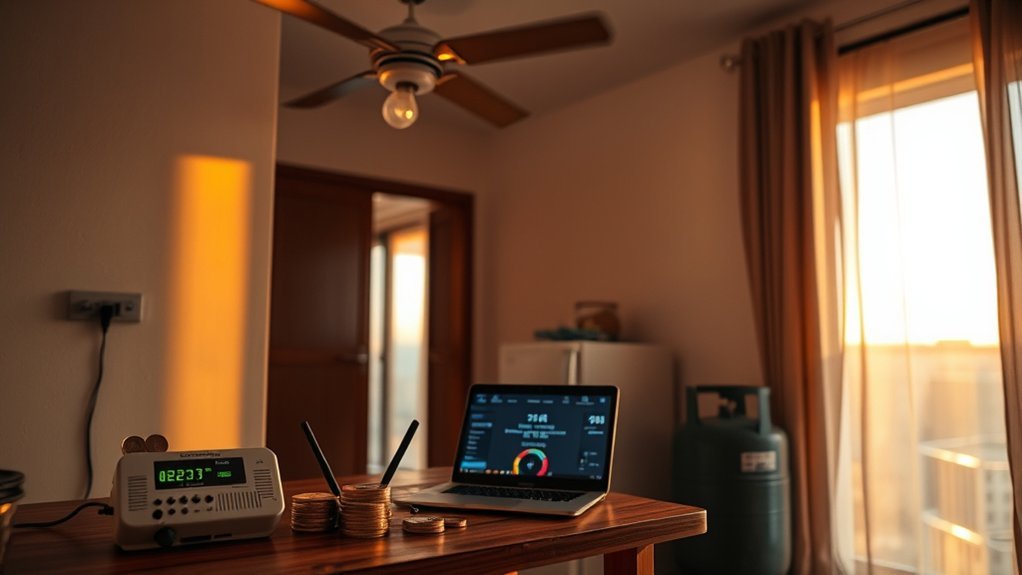
If you’re budgeting for life in Botswana, plan on monthly household utilities averaging about $74 for services like water, garbage and basic heating or cooling, while electricity can run considerably higher—often around 1,200 P depending on usage.
You’ll see variation: a 915 sq ft apartment’s basic utilities commonly range 300–1,360 P, averaging roughly 627.78 P. Internet is a separate line item; plans at 50 Mbps+ cost about $77.70 per month, so factor that into recurring bills.
Water alone typically runs 300–600 P monthly depending on consumption and location.
Water typically costs about 300–600 P per month, varying with consumption and location.
- Utilities: expect ~627.78 P on average for basic services in a mid-size apartment.
- Internet: budget ~77.7 USD for reliable 50 Mbps+ service.
- Electricity & water: electricity often ~1,200 P; water 300–600 P—adjust for usage.
Track meter readings, choose capped data plans if needed, and prioritize energy-efficient appliances to keep total utilities, internet and household bills predictable.
Transportation Costs: Public Transit, Taxis and Fuel
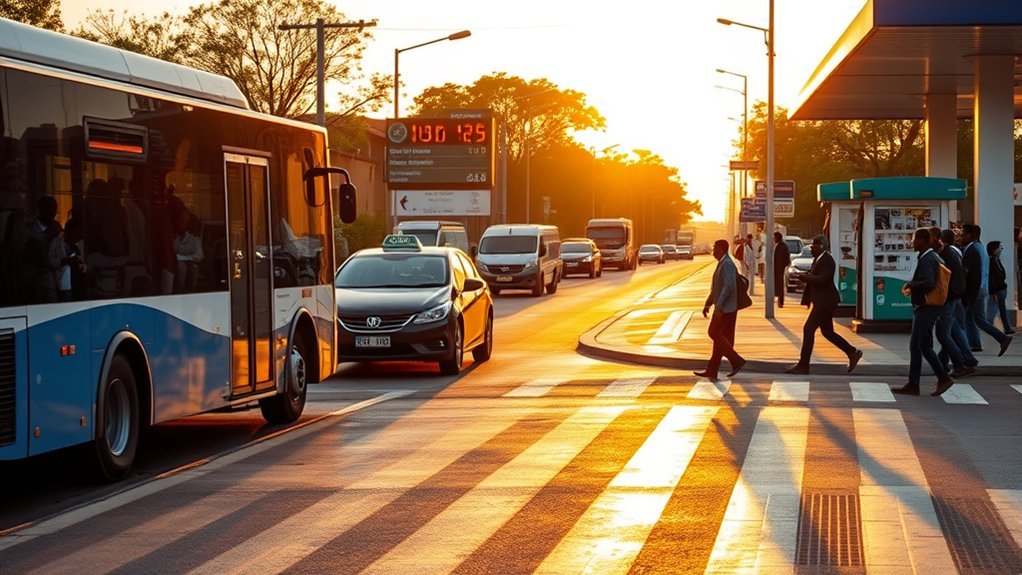
Because transportation choices quickly shape your monthly budget, plan around a mix of low-cost public transit, occasional taxis, and fuel if you drive. You’ll pay about 7.00 P for a one-way local ticket (typically 7–8 P), while a monthly pass runs roughly 352.00 P (wide 250–600 P). Taxis start near 8.00 P under normal tariffs (range 6–9 P), useful for short trips or late nights when transit is limited.
Compare modes with this quick reference:
| Mode | Typical Cost | Cost Range |
|---|---|---|
| Single bus/train | 7.00 P | 7.00–8.00 P |
| Monthly pass | 352.00 P | 250.00–600.00 P |
| Taxi start fare | 8.00 P | 6.00–9.00 P |
If you drive, gasoline averages 56.39 P/gal (37.85–57.24 P). Buying a new Volkswagen Golf costs about 250,000.00 P (160,000–300,000 P) — factor purchase, fuel, insurance, and maintenance into total transportation costs.
Healthcare, Insurance and Medical Expenses
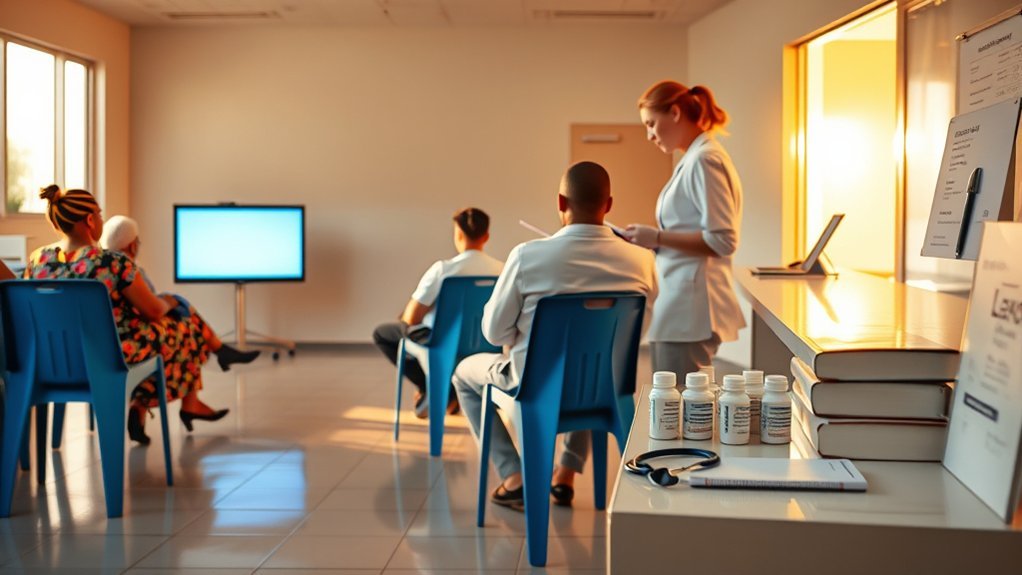
Getting around affects more than your monthly commuting budget — it also determines your access to care when you need it. In Gaborone and other major cities, healthcare standards are reasonable; public treatments typically cost around £50, but quality drops in rural areas.
Many expats choose private facilities for faster service, better emergency response and predictable pricing. You should budget for international health insurance to cover private care and possible medical evacuation — premiums vary by age, coverage and preexisting conditions.
Many expats prefer private clinics for quicker, reliable care — budget for international insurance and possible medical evacuation.
Preventive care and vaccinations are recommended; costs depend on provider and location.
- Public care: ~£50 per treatment in cities; variable quality outside urban centers.
- Private care: higher fees, faster access, preferred by expatriates; insurance recommended.
- Insurance: international plans cover private treatment and evacuation; shop by coverage limits and network hospitals.
Compare plan limits, excesses and hospital networks to estimate annual medical spending accurately when planning your Botswana budget.
Salaries, Taxes and Purchasing Power
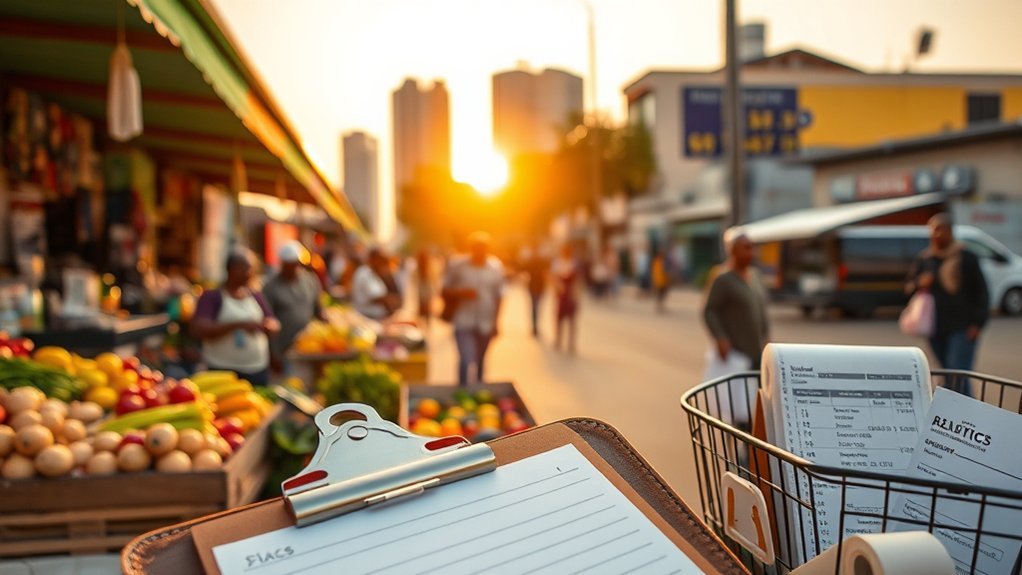
You’ll find the average net salary in Botswana is about 11,505 P per month, after taxes.
With a cost of living index of 30.1 and typical essentials like utilities around 628 P monthly, that paycheck stretches further than in many higher-cost countries.
Compare local prices—dinner for two averages $28.80 vs $78.20 in the US—to gauge your real purchasing power.
Average Take-Home Pay
Salary figures tell a clear story: the average monthly take-home pay in Botswana is about 11,505 Pula after tax, which gives you a practical framework to judge affordability.
With an average cost of living index near 30.1, you’ll find that this net salary stretches further than in many countries. Essentials like utilities (≈627.78 Pula) and city-center rent (≈3,000 Pula) take predictable shares of your paycheck, while dining out at inexpensive restaurants (~60 Pula) remains affordable for routine meals.
- Rent (~3,000 Pula) typically consumes a large portion of monthly income.
- Utilities (~628 Pula) are modest relative to net pay.
- Meals (~60 Pula) and daily expenses fit comfortably within budget projections.
Local Purchasing Power
While taxes and living costs vary across cities, your average take-home pay of about 11,505 Pula gives you a clear baseline for purchasing power in Botswana.
You’ll see essentials like utilities for a 915 sq ft apartment at about 627.78 Pula—roughly 5.5% of net income—so fixed bills won’t dominate your budget.
Public transport is cheap (7 Pula one-way), letting you reduce car dependence; buying a new Volkswagen Golf (~250,000 Pula) would be a major purchase that strains savings.
Gaborone’s cost-of-living index (42.1) signals higher local prices compared with smaller towns, so adjust expectations and budgets.
Open a local account to manage monthly flows, track spending, and prioritize housing and transport when planning sustainably.
Moving to Botswana: Visas, Residency and Practical Costs
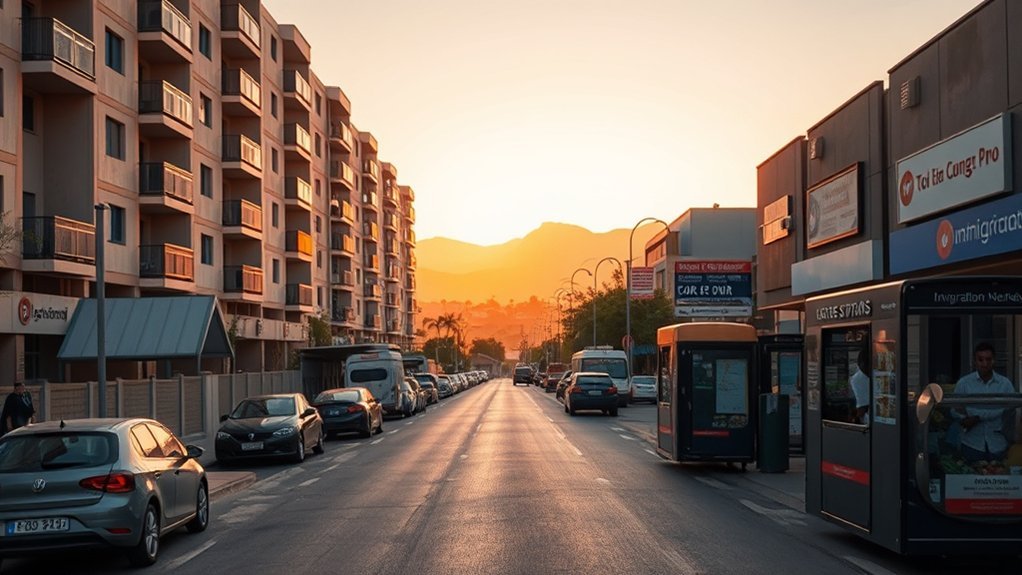
Moving to Botswana means planning for a short-term entry and a longer-term residency path: citizens of most Commonwealth countries can enter visa-free for up to three months, but you’ll need a Residence Permit (about BWP 1,500) for longer stays and should expect a decision within roughly 30 days.
When moving to Botswana, factor permit fees, supporting-document costs and possible translation or notary charges into your budget. Expect to be able to apply for permanent residency after five years on a valid Residence Permit.
- Residency costs: BWP 1,500 application fee, supporting docs, courier and translation expenses.
- Living-cost context: rent in Gaborone, Maun or Francistown is affordable versus UK standards but a main monthly expense; grocery prices like BWP 14/litre milk guide food budgets.
- Practical banking: open a local account for daily bills and keep an offshore account for foreign earnings; consider major banks for transfers and account services.
This data-driven, cost-focused approach helps you estimate upfront and recurring expenses when moving to Botswana.
Money, Banking and Managing Currency Exchange
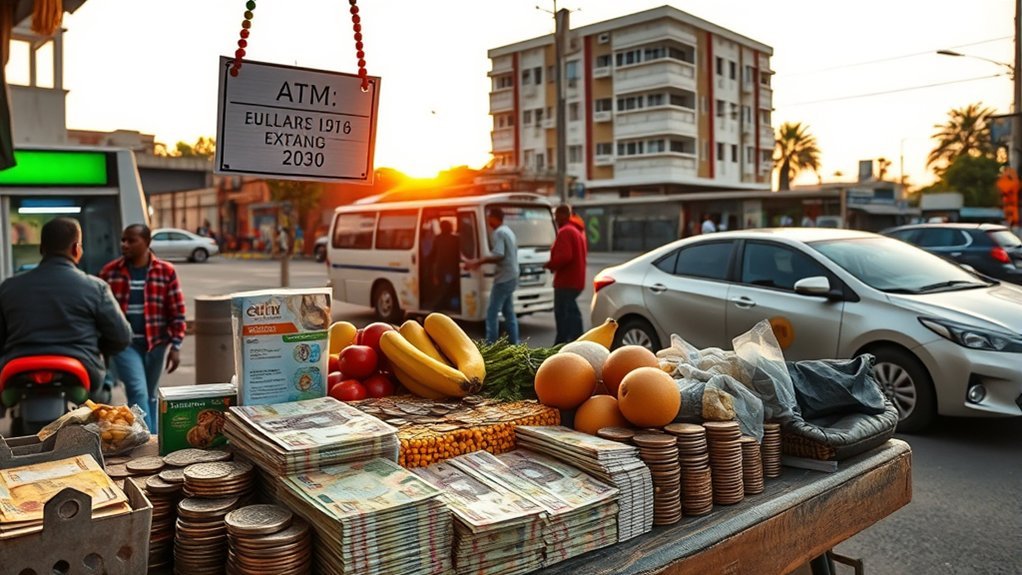
Because exchange rates and fees directly affect what you can spend, set up a local banking plan before you arrive: average net pay in Botswana is about 11,505.21 P per month, so align accounts to that benchmark.
Open local accounts with Bank of Botswana, Bank Gaborone, First National Bank or Standard Chartered for payroll and lower withdrawal costs. Use Wise for cross-border money, as its card eliminates exchange rate markups and high transaction fees, and you can get local account details in over 40 currencies to receive payments.
Track live rates with currency converter tools to time transfers and convert only what you need. When managing currency exchange, compare bank spread, transfer fees and ATM charges; small differences compound against a monthly salary of ~11.5k P.
For business or irregular income, keep a Wise multi-currency balance and one local bank account for domestic bills. That dual approach minimizes fees and keeps your money working efficiently.
Frequently Asked Questions
How Much Money Do You Need to Live in Botswana?
You’ll need roughly 8,000–12,000 P monthly for basic Living Expenses in Botswana: rent, utilities, food, transport; expect higher costs in Gaborone, cheaper outside city centers, and adjust based on lifestyle and dining or entertainment choices.
Is Botswana a Cheap Place to Live?
You’re right to test the theory: Botswana is generally cheap. Living expenses like 60 P meals, 3,000 P city rent, 627.78 P utilities, and 7 P transport keep costs low for budget-conscious, travel-savvy residents.
Can an American Move to Botswana?
Yes — you can move to Botswana; Visa Requirements involve short-stay entry without a visa for Americans, but you’ll need a Residence Permit (BWP 1,500 fee, supporting documents), processing ~30 days, and five years for permanent residency.
Can Foreigners Buy a House in Botswana?
Yes — you can buy property ownership in Botswana, but expect legal restrictions, BITC investment approval, and limits on unimproved land; consult a local lawyer, budget for fees, and maintain a local bank account for transactional costs and taxes.
Conclusion
Living in Botswana balances modest everyday costs with higher prices for imports and private services; expect rent and groceries to dominate your budget while utilities, healthcare and internet add steady overhead. Plan using local salary ranges and tax brackets to gauge purchasing power, and budget for visa/residency fees and currency exchange losses. Think of your budget like a dry-season river: predictable channels (rent, food) with occasional high-water spikes (healthcare, flights) you’ll need to bridge.

